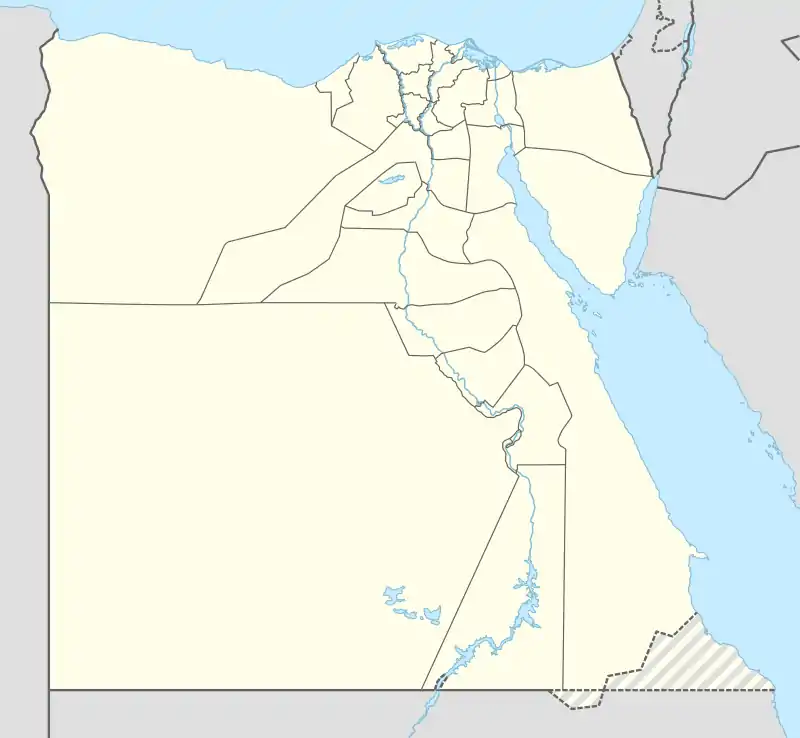Jabal Hamzah ballistic missile test and launch facility
Ballistic missile test and launch facility was built in the late 1950s and it is the oldest functioning ballistic missile installation in the developing world, located near Jabal Hamzah 62 kilometres (39 mi) west-northwest of Cairo.[2]
| Jabal Hamzah Ballistic Missile Test and Launch Facility | |
|---|---|
قاعدة إطلاق و اختبار الصواريخ الباليستية بجبل حمزة | |
| Part of the Egyptian Army | |
| near 6th October City and Sheikh Zayed City, Giza, Cairo in Egypt | |
 | |
 Jabal Hamzah Ballistic Missile Test and Launch Facility Location of Jabal Hamzah Ballistic Missile Test and Launch Facility | |
| Coordinates | 30°07′32.7″N 30°36′18.5″E |
| Type | Missile launch facility |
| Area | Unknown[1] |
| Site information | |
| Owner | Egyptian Armed Forces |
| Operator | Egyptian Army |
| Open to the public | No |
| Condition | Unknown[1] |
| Site history | |
| Built | Late 1950s[2] |
| Battles/wars | Yom Kippur War[3] |
| Events | Al Zafir and Al Kahir SRBMs testing[3][4] |
History
After Egypt's defeat in 1948 Arab-Israeli War, Egypt started the missile program and became interested in ballistic missiles after the presidency of Gamal Abdel Nasser and the 1956 Suez Crisis, as the importance of ballistic missiles had arisen to penetrate Israeli airspace.[4][5]
Egypt attempted to acquire ballistic missiles from the Soviet Union but failed and then Egypt focused on the indigenous rocket program that was developed by German scientists based on German V-2, Wasserfall and the French Véronique rockets technology in 1960.[4]
During the late 1950s, Egypt constructed the Jabal Hamzah ballistic missile facility to conduct test fires.[2]
Overview
In 2010, an analysis had been published using satellite imagery from commercial sources that shows between 2001 and 2009, Jabal Hamzah facility experienced an increase in activity and expansion as new constructions took place including a new missile launch pad and horizontal processing building.[2][6][7]
See also
References
- "Gebel Hamza Test Range". NTI. James Martin Center for Nonproliferation Studies. Retrieved 4 September 2014.
- Bermudez Jr., Joseph S. (2010). "Pyramid Scheme: Egypt's Ballistic Missile Test and Launch Facility". Jane's Intelligence Review. 22: 48–52.
- "Jabal Hamzah". Encyclopedia Astronautica. Archived from the original on 3 March 2016. Retrieved 3 September 2014.
- "Egypt - Missile". NTI. James Martin Center for Nonproliferation Studies. Archived from the original on 26 October 2014. Retrieved 4 September 2014.
- Mellen, Cyndi (27 April 2010). Lessons from Nuclear Reversal: Why States Reverse Ballistic Missile Policy (Thesis for Bachelor of Arts in Political Science). University at Albany, State University of New York. pp. 13–14. Retrieved 4 September 2014.
- "Reports have Egypt upgrading ballistic missile facility". Intelligence Quarterly. 9 February 2010. Retrieved 4 September 2014.
- Pollack, Joshua (July 2011). "BALLISTIC TRAJECTORY The Evolution of North Korea's Ballistic Missile Market" (PDF). The Nonproliferation Review. Routledge Taylor and Francis Group. 18 (2): 416. doi:10.1080/10736700.2011.583120. ISSN 1073-6700. Retrieved 4 September 2014.